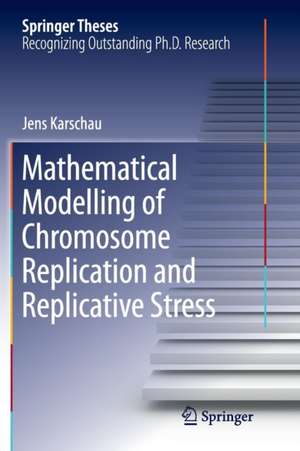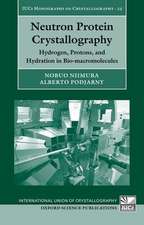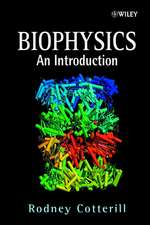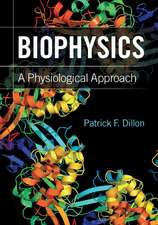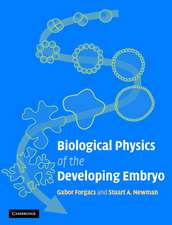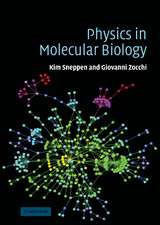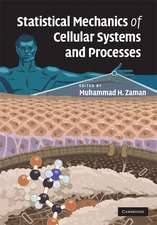Mathematical Modelling of Chromosome Replication and Replicative Stress: Springer Theses
Autor Jens Karschauen Limba Engleză Paperback – 10 sep 2016
This work makes important contributions to this line of research. In particular, it addresses two key questions in the area of DNA replication: which evolutionary forces drive the positioning of replication origins in the chromosome and how is the spatial organization of replication factories achieved inside the nucleus of a cell?.
A cross-disciplinary approach uniting physics and biology is at the heart of this research. Along with experimental support, statistical physics theory produces optimal origin positions and provides a model for replication fork assembly in yeast. Advances made here can potentially further our understanding of disease mechanisms such as the abnormal replication in cancer.
| Toate formatele și edițiile | Preț | Express |
|---|---|---|
| Paperback (1) | 630.57 lei 6-8 săpt. | |
| Springer International Publishing – 10 sep 2016 | 630.57 lei 6-8 săpt. | |
| Hardback (1) | 636.63 lei 6-8 săpt. | |
| Springer International Publishing – 25 iul 2014 | 636.63 lei 6-8 săpt. |
Din seria Springer Theses
- 18%
 Preț: 997.88 lei
Preț: 997.88 lei -
 Preț: 389.88 lei
Preț: 389.88 lei - 15%
 Preț: 646.94 lei
Preț: 646.94 lei - 18%
 Preț: 943.43 lei
Preț: 943.43 lei -
 Preț: 399.29 lei
Preț: 399.29 lei - 18%
 Preț: 944.99 lei
Preț: 944.99 lei - 15%
 Preț: 636.80 lei
Preț: 636.80 lei - 18%
 Preț: 941.05 lei
Preț: 941.05 lei - 15%
 Preț: 643.16 lei
Preț: 643.16 lei - 15%
 Preț: 642.68 lei
Preț: 642.68 lei - 18%
 Preț: 1103.62 lei
Preț: 1103.62 lei - 20%
 Preț: 558.83 lei
Preț: 558.83 lei - 18%
 Preț: 1112.30 lei
Preț: 1112.30 lei - 18%
 Preț: 944.19 lei
Preț: 944.19 lei - 18%
 Preț: 1109.92 lei
Preț: 1109.92 lei - 18%
 Preț: 1217.27 lei
Preț: 1217.27 lei - 15%
 Preț: 640.06 lei
Preț: 640.06 lei - 15%
 Preț: 636.45 lei
Preț: 636.45 lei - 15%
 Preț: 640.06 lei
Preț: 640.06 lei - 15%
 Preț: 640.88 lei
Preț: 640.88 lei -
 Preț: 389.70 lei
Preț: 389.70 lei - 20%
 Preț: 563.91 lei
Preț: 563.91 lei -
 Preț: 393.35 lei
Preț: 393.35 lei - 15%
 Preț: 637.93 lei
Preț: 637.93 lei - 15%
 Preț: 641.85 lei
Preț: 641.85 lei - 18%
 Preț: 1225.94 lei
Preț: 1225.94 lei - 20%
 Preț: 551.36 lei
Preț: 551.36 lei - 18%
 Preț: 1229.10 lei
Preț: 1229.10 lei - 15%
 Preț: 639.25 lei
Preț: 639.25 lei - 18%
 Preț: 999.45 lei
Preț: 999.45 lei - 15%
 Preț: 640.06 lei
Preț: 640.06 lei - 18%
 Preț: 1220.45 lei
Preț: 1220.45 lei - 18%
 Preț: 1116.26 lei
Preț: 1116.26 lei - 18%
 Preț: 1110.72 lei
Preț: 1110.72 lei - 18%
 Preț: 1000.87 lei
Preț: 1000.87 lei - 18%
 Preț: 891.17 lei
Preț: 891.17 lei - 15%
 Preț: 640.06 lei
Preț: 640.06 lei - 5%
 Preț: 1154.07 lei
Preț: 1154.07 lei - 15%
 Preț: 635.96 lei
Preț: 635.96 lei - 15%
 Preț: 640.88 lei
Preț: 640.88 lei -
 Preț: 387.20 lei
Preț: 387.20 lei - 18%
 Preț: 1109.92 lei
Preț: 1109.92 lei -
 Preț: 385.25 lei
Preț: 385.25 lei -
 Preț: 385.25 lei
Preț: 385.25 lei - 18%
 Preț: 1112.30 lei
Preț: 1112.30 lei - 18%
 Preț: 999.45 lei
Preț: 999.45 lei -
 Preț: 386.99 lei
Preț: 386.99 lei - 15%
 Preț: 637.13 lei
Preț: 637.13 lei - 20%
 Preț: 554.21 lei
Preț: 554.21 lei - 20%
 Preț: 555.59 lei
Preț: 555.59 lei
Preț: 630.57 lei
Preț vechi: 741.85 lei
-15% Nou
Puncte Express: 946
Preț estimativ în valută:
120.68€ • 125.52$ • 99.62£
120.68€ • 125.52$ • 99.62£
Carte tipărită la comandă
Livrare economică 14-28 aprilie
Preluare comenzi: 021 569.72.76
Specificații
ISBN-13: 9783319362823
ISBN-10: 3319362828
Pagini: 89
Ilustrații: XIII, 76 p. 57 illus., 9 illus. in color.
Dimensiuni: 155 x 235 x 5 mm
Greutate: 0.15 kg
Ediția:Softcover reprint of the original 1st ed. 2015
Editura: Springer International Publishing
Colecția Springer
Seria Springer Theses
Locul publicării:Cham, Switzerland
ISBN-10: 3319362828
Pagini: 89
Ilustrații: XIII, 76 p. 57 illus., 9 illus. in color.
Dimensiuni: 155 x 235 x 5 mm
Greutate: 0.15 kg
Ediția:Softcover reprint of the original 1st ed. 2015
Editura: Springer International Publishing
Colecția Springer
Seria Springer Theses
Locul publicării:Cham, Switzerland
Cuprins
Introduction.- Optimal Origin Placement for Minimal Replication Time.- Actively Replicating Domains Randomly Associate into Replication Factories.- Summary and Conclusions.
Textul de pe ultima copertă
DNA replication is arguably the most crucial process at work in living cells. It is the mechanism by which organisms pass their genetic information from one generation to the next, and life on Earth would be unthinkable without it. Despite the discovery of DNA structure in the 1950s, the mechanism of its replication remains rather elusive.
This work makes important contributions to this line of research. In particular, it addresses two key questions in the area of DNA replication: which evolutionary forces drive the positioning of replication origins in the chromosome; and how is the spatial organization of replication factories achieved inside the nucleus of a cell?
A cross-disciplinary approach uniting physics and biology is at the heart of this research. Along with experimental support, statistical physics theory produces optimal origin positions and provides a model for replication fork assembly in yeast. Advances made here can potentially further our understanding of disease mechanisms such as the abnormal replication in cancer.
This work makes important contributions to this line of research. In particular, it addresses two key questions in the area of DNA replication: which evolutionary forces drive the positioning of replication origins in the chromosome; and how is the spatial organization of replication factories achieved inside the nucleus of a cell?
A cross-disciplinary approach uniting physics and biology is at the heart of this research. Along with experimental support, statistical physics theory produces optimal origin positions and provides a model for replication fork assembly in yeast. Advances made here can potentially further our understanding of disease mechanisms such as the abnormal replication in cancer.
Caracteristici
Nominated as an outstanding Ph.D. thesis by the University of Aberdeen, UK May contribute to resolving the random completion problem in biology Comprehensive introduction on DNA replication as well as DNA replication modelling suitable also for non-biologists Includes supplementary material: sn.pub/extras
